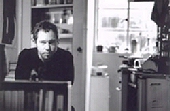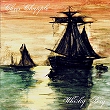
 Australia - Full Moon 76 - 12/19/02
Australia - Full Moon 76 - 12/19/02
Chris Chapple
an interview with...
Quality over quantity
Four years ago, Chris Chapple, the former guitarist in the amazing (and highly underrated)
Australian four-piece Autohaze released his first solo effort, It's A Wonderful World.
And, by playing all the instruments by himself and releasing the album on his own Cruel But Fair
label, he left behind his indie-rock past and created a beautiful quiet and laidback singer/songwriter
record. Four years on, he has just released his second solo album (you can order it through his
website, titled Whisky Bay. And while it's
still his pleasantly warm voice that draws you in immediately, he fleshed out the music a bit
more this time, using the talents of the Chris Chapple Ensemble - Brett Poliness on drums/percussion,
Dan Luscombe on guitar and Sean Simmons on bass. And that certainly works quite well, as the full
band (plus saxophone and violin) definitely add a lot to Chris' simple,but great pop songs, that
bear some similarities to his fellow countrymen Crowded House and The Go-Betweens. Luna Kafé
recently had the chance to ask Chris how the changes came about.
Luna Kafé: I always thought that your records (both solo and with Autohaze)
never quite got the attention that they would have deserved, so looking back on your musical career
at this point, do you think it's a blessing or a curse that you live in Melbourne, Australia and
and not New York or London?
Chris: "A blessing, I think. If I lived in either New York or London, I would either:
a)...have become really big, let it go to my head, turned into an asshole and then been forgotten
about, or b)...not have made the slightest impact, become incredibly depressed, and given up on
music. (That of course is all just a guess)."
Luna Kafé: I think what's mentioned on the press sheet, that the new album
picks up where It's A Wonderful Life left off, is a pretty good indication of the record's
sound. Was it intentional that there are certain links (like the acoustic opener) or did it simply
turn out that way?
Chris: "I like to keep a continuity, hence the intermission dialogue and the layout of the
artwork. I can't really think of any reason why I wanted to...it just made sense to do it that way.
Little things for the trainspotters to pick up on."
Luna Kafé: I quite like the horns. That stuff always reminds me of Van Morrison
or classic 70s Stones. Where did the idea to use the horns come from?
Chris: "Because the songs I used them on ("If You Love A Leaver", "One Day We'll Both Be
Well Again") both had a kind of 'classic' feel, which I felt horns would suit. In a way this was
a part of expanding the sound from the last album. That was generally the way I worked for the
whole album; once the basis of the song was recorded, I'd work according to which 'way' the song
seemed to be heading...for instance 'this sounds like the sort of song that you'd hear a saxophone
solo in", or "this chorus really has a 'handclap' feel to it'."
Luna Kafé: How did the whole working process change for you now that you've
got a band? In other words: How much input do the other musicians have?
Chris: "As long as certain thing were covered, ie as long as the feel was right, and the
chords were right, and any specific riffs etc were covered, I pretty well let them play what they
wanted. When Dan (guitarist) was recording his part on "Seen On The Surface", he got to the last
chorus and he played something a little different to what he had on the other choruses...we both
agreed it worked better, and so redid the whole part. It was kind of 'objective improvisation',
where you make stuff up, and keep what works the best. The result was playing that was more
varied in style than if I had done it all myself."
 Luna Kafé: I guess a lot of people liked the somewhat sparse mood of the first
album a lot and you obviously could have had a lot bigger production on "Whisky Bay" now. Was that
sort of the masterplan to keep things fairly simple still or would you have wanted to make a
Pet Sounds if you had the time and resources?
Luna Kafé: I guess a lot of people liked the somewhat sparse mood of the first
album a lot and you obviously could have had a lot bigger production on "Whisky Bay" now. Was that
sort of the masterplan to keep things fairly simple still or would you have wanted to make a
Pet Sounds if you had the time and resources?
Chris: "If I wasn't still limited by the fact that I'm recording on an 8-track, the production,
I'm sure, would have been a lot bigger...but then again, the album probably wouldn't be finished
yet. As it was I'd used up every spare inch of the 8 tracks. If I had 24 tracks to work with...I'm
sure I would have done the same. I'm glad to be limited by my equipment...it means that I have
to (try to) get the best out of what is put down, and put more thought into sounds and arrangements.
Quality over quantity."
Luna Kafé: When you started out making this album, did you set different goals
compared to your previous record(s)?
Chris: "I don't think I ever sat down and thought about specific goals for this album, or
the last. The goal, I think, for any creative artist, is to express as completely as possible the
'idea' in their head, and to satisfy themselves that they've done their best. I just wanted to
come up with something that would please anyone who liked the last album, and that, when I hear
it, I'll think of as the most ideal expression of what I had in mind."
Luna Kafé: On the new album you seem to draw your inspiration from a quite
wide range of musical eras and genres. Do you just feel more confident as a musician (and arranger)
now so that you decided you were ready to try out more things?
Chris: "I wanted to make this album a bit more varied than the last...it's still basically
guitar-oriented pop music, but painting with a wider range of colours on the palette."
Luna Kafé: Talking of influences: Would you be willing an able to recommend
five underrated records and maybe give us a short explanation why you picked them?
Chris:
1) Incredible String Band: Incredible String Band (1966) - "They did become pretty big, I
think, in England around their third album in 1967 or 68, but it's the best musical discovery
that I've made recently. Simple, sparse, funny, inspired songs, incorporating folk music of any
and all persuasion. Lyrically up there with Dylan (!!!).
2) Vic Chesnutt: West Of Rome (1992) - "His second, and definitely his best album.
The perfect home recording."
3) Sixteen Horsepower: Sackcloth And Ashes (1996) - "Revived the spirit of the Gun
Club. Brilliant Faulkner-esque lyrics over some awesome Southern slide and accordion driven
swamp-rock."
4) Terry Reid: Bang Bang, You're Terry Reid (1968) - "Perfect 60's Rock. He was in
the running to be the lead singer for a new supergroup that was going to be called Led Zeppelin.
I wish he had got it. He could sing the Plant bits better than Plant, and had a great lower
register as well. Great versions of "Season Of The Witch" and "Something's Got A Hold Of My Heart"."
5) Eileen Rose: Shine Like It Does (2000) - "Kind of a Lucinda Williams with a bit
more rock/folk thrown in. Some very beautiful and moving songwriting, a great voice and not too
produced or bombastic."
Luna Kafé: Last question: Was there a special event in your life, a piece of
music you heard that made you decide to become a musician? What was it?
Chris: "Puberty. The first band I really loved was The Pretenders. Their first album is
one of my all-time favourites. I suspect that it all sprang from the fact that I had a huge
teenage crush on Chrissie Hynde, and that made the music a kind of 'awakening' for me...and gave
it an extra power. That crush also shaped my taste in girls.Also Van Morrison (obviously for
different reasons) - my second musical love - through whom I learned about music's ability to
really deeply move, and its spirituality. So basically I learned about Sex in music from
Chrissie, and Soul in music from Van."
Copyright © 2002 Carsten Wohlfeld (Photo © Stephen Moyle)  (Photo © Stephen Moyle) (Photo © Stephen Moyle)
|

 Luna Kafé: I guess a lot of people liked the somewhat sparse mood of the first
album a lot and you obviously could have had a lot bigger production on "Whisky Bay" now. Was that
sort of the masterplan to keep things fairly simple still or would you have wanted to make a
Pet Sounds if you had the time and resources?
Luna Kafé: I guess a lot of people liked the somewhat sparse mood of the first
album a lot and you obviously could have had a lot bigger production on "Whisky Bay" now. Was that
sort of the masterplan to keep things fairly simple still or would you have wanted to make a
Pet Sounds if you had the time and resources?